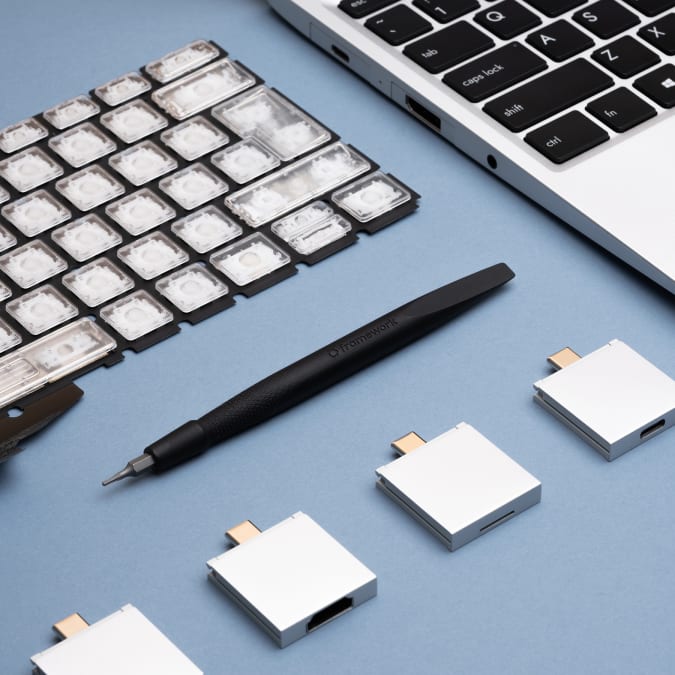As devices become less and less repairable, it’s always heartening when companies build devices with an eye on sustainability. After all, repairing the machine you already own will almost always be more friendly to the environment than buying a new one. Framework is a hardware startup, founded by former Oculus engineer Nirav Patel, that is looking to take the Fairphone model and bring it to laptops, even shipping with a screwdriver in the box.
Today, the company is announcing its first product, the Framework laptop, a 13.5-inch notebook with a number of modular parts. The idea is that users can swap out several of the components when they break, or upgrade them when technology moves on. Now, repairable laptops aren’t a new invention, but the focus here looks to be making this as friendly for novices as it possibly can be.
The Framework laptop is packing a 13.5-inch, 2,256 x 1,504 3:2 display which is hidden behind a series of magnetic bezels, making it easy to replace. It is also packing a 1080p, 60fps webcam with a hardware privacy switch and a keyboard with 1.5mm key travel. As for the chip, you’ll get the option of selecting a quad-core 11th-generation Intel Core CPU alongside with WiFi 6, up to 64GB of DDR4 and up to 4TB of Gen4 NVME SSD storage.
Almost all of the machine’s components, including the display, battery, keyboard and the display bezels are replaceable. Inside, you’ll also find that the SSDs, memory and WiFi modules all use industry-standard sockets; the only thing that isn’t is the CPU, in fact. If you want to upgrade that, you’ll need to pull out and return the mainboard, newer versions of which will be available from Framework’s store when new chip options arrive.
Patel said that each module “uses a single labelled connector,” and most of them have “pull tabs to make them easy to handle.” He added that, of the components that can be replaced, the only problematic one is the mainboard itself, since you’d need to disconnect everything that it connects to before removal. But, he added, ripping out the machine’s heart would be a pretty rare event.
Naturally, whenever people discuss repairability, there’s always the idea that this is an eat-your-vegetables situation, with low-end specs and clunky performance. Patel says that this isn’t the situation here, saying that he wants to meet, or beat, the ThinkPad T, Surface Laptop and XPS 13 on performance.

Framework
One of the more interesting elements of Framework’s conception is how the company handles the ports running down both sides of the machine. Rather than fixing the port selection and running the risk of obsolescence, the company has built what it’s calling “expansion cards.” These are little boxes with the option of adding a USB-C, USB-A, HDMI, DisplayPort, MicroSD, an extra SSD or a discrete headphone amp to the chassis. In order to make these expansion cards universal, the company has built USB-C ports directly onto the laptop’s mainboard. Making them, broadly speaking, more like dongles than actual hardware ports.
Beyond the pledge to make the laptop easy to upgrade and repair, Framework is also burning its other environmental credentials. It says that the machine is made of up to 50 percent post-consumer recycled aluminum and up to 30 percent post-consumer recycled plastic. Oh, and the packaging is recyclable, with no single-use plastics, and all of the shipments are carbon offset.
The Framework laptop will begin shipping at some point this summer for an as-yet unspecified price, although Patel said buyers wouldn’t be paying “a premium for longevity.” Instead, the hardware will be “on par with other well-reviewed notebooks with similar silicon.” Users can opt for a number of pre-configured models running either Windows 10 Home or Pro, while a DIY edition will ship to you disassembled.
Article From & Read More ( Startup designs a modular, repairable laptop - Engadget )https://ift.tt/3swRb2t
Technology
Bagikan Berita Ini














0 Response to "Startup designs a modular, repairable laptop - Engadget"
Posting Komentar